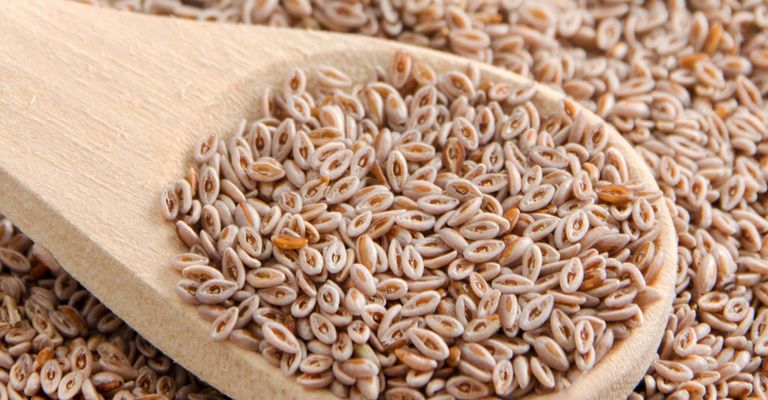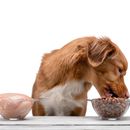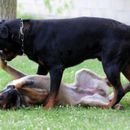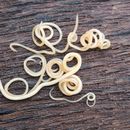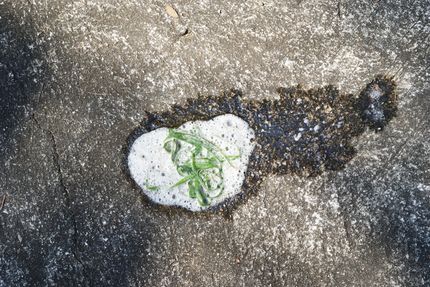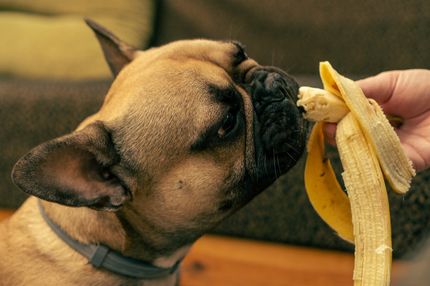If you are looking for natural means to strengthen the health of your four-legged friend, psyllium husks might be interesting for you.
This post is about the exact dosage, possible side effects and benefits of this useful supplement. Whether it's for indigestion, weight control, or regulating blood sugar, psyllium husks can be beneficial.
Can dogs safely consume psyllium husks?
Join us to learn how they can help your dog.
Psyllium husks: What are they and what role do they play for dogs?
Psyllium husks come from the seeds of the Plantago ovata plant, which grows primarily in India.As a natural soluble source of fiber, they are often recommended for digestive support.
Dogs can benefit from psyllium husks for several reasons:
- Digestive support:They can help regulate a dog's feces as they absorb moisture and form a gel-like consistency. This can be useful for both diarrhea and constipation.
- Weight control: because they swell in the stomach, they can give dogs a feeling of fullness, which can help with weight loss.
- Blood sugar levels: research suggests they may help lower blood sugar levels.
It is important that psyllium husks are always given with enough water to prevent constipation. In addition, consult with your veterinarian before making any changes in your dog's diet.
Advantages of psyllium husks for the dog
- Digestive support:
- Regulation of bowel movements: the soluble fibers contained in psyllium husks can help with both constipation and diarrhea. They absorb water and swell in the intestines, causing the stool to become more voluminous and softer. In diarrhea, they act as binders and can absorb excess fluid.
- Weight management:
- Satiety: Because of their swelling properties, psyllium husks can promote a feeling of satiety, which may be helpful in weight control or weight loss in overweight dogs.
- Gut Health:
- Prebiotic effect: Psyllium husks can serve as a food source for beneficial intestinal bacteria, which promotes the growth of healthy microorganisms, contributing to the health of the intestinal microbiome.
- Naturalness:
- Psyllium husks are a natural product, which makes them a preferred choice over chemical laxatives or other synthetic products.
Disadvantages of psyllium husks for dogs
- Overdose:
- Constipation: if psyllium husks are given in excessive amounts or without adequate water intake, they can cause constipation or make it worse.
Allergic reactions:
- Some dogs may have allergic reactions to psyllium husks or impurities in the product. Signs include itching, rash or digestive upset.
Possible drug interactions:
- Psyllium husks may interfere with the absorption of some medications, so they should not be given at the same time as certain medications.
Acclimation period required:
- Sudden introduction of psyllium husks may cause bloating, cramping, or diarrhea. It is advisable to introduce them gradually into the diet.
Cost:
- Although they are not particularly expensive, psyllium husks still represent an additional cost item in pet care.
Possible side effects of psyllium husks in dogs: an exquisite consideration
Psyllium husks, the noble contribution of the Plantago ovata plant to the world of nutritional supplements, have always been lauded for their high fiber content. While their numerous benefits, especially in terms of digestive support, are widely recognized in the animal health world, there are subtle nuances to their effects that can cause undesirable side effects in some cases.
Subtle dosage sensitivities: One of the most notable characteristics of psyllium husks is their exceptional swelling ability. However, this exquisite property, if used unwisely, can lead to excessive water absorption into the digestive tract. Paradoxically, the result can be constipation, especially if the dog is not provided with adequate water.
A delicate play on the microbiome, psyllium husks, when introduced suddenly and in large quantities into the diet, can upset the delicate balance of intestinal flora. The result? A ballet of bloating, abdominal cramps or even diarrhea.
Interactions of aristocratic complexity: Though a seemingly innocent addition in their naturalness, psyllium husks hold the potential to interfere with the delicate interplay of medications an animal may be taking. They could interfere with the noble task of some medications to achieve their therapeutic effects by interfering with their absorption.
Allergic reactions: In rare cases, the stage of a dog's immune system could stage a dramatic performance, inspired by the psyllium husks or potential contaminants in them. The symptoms? An opera of itching, skin rashes or digestive upheaval.
The far-reaching importance of psyllium husks to many dogs cannot be denied. However, their use requires a sensitive approach on the part of the main person responsible - the prudent dog owner. One should always keep in mind the potential surprises and challenges that this powerful herbal addition could bring.
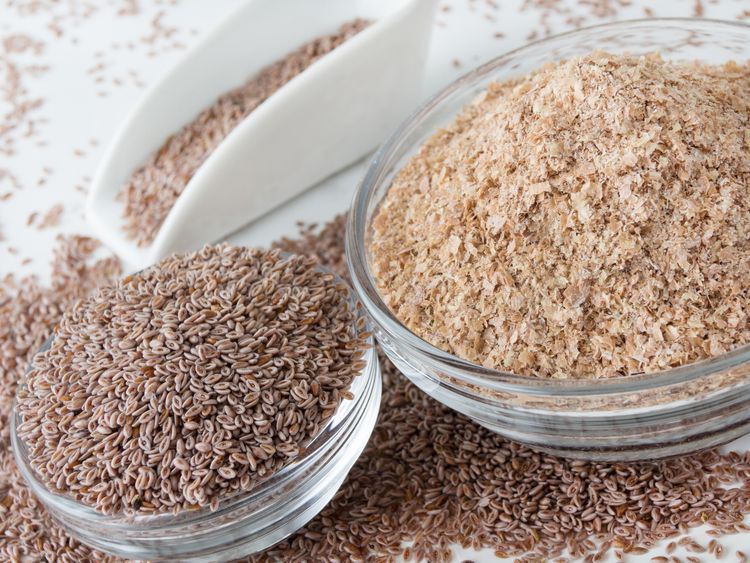
Dosage instructions for psyllium husks
Proper dosing can seem a bit challenging at first.
Generally, 1 gram of psyllium husks per 5 kilograms of body weight should be administered.
How best to give psyllium husks to dogs
There are different ways to introduce psyllium husks into a dog's diet:
Mix with food:
- Probably the easiest and most common method is to add psyllium husks directly to the dog's food.
- However, before you add them to the food, it is advisable to soak them in water for a few minutes to let them swell. This will ensure that they don't swell up too much in the dog's stomach, causing possible digestive problems.
- After they have swelled, you can simply mix them into your dog's dry or wet food.
Serve as a porridge:
- Some dogs prefer the psyllium husks as a separate "porridge".
- To do this, you can soak the psyllium husks in enough water and then serve them to your dog in a separate bowl.
- This method can be especially useful if you want to make sure your dog is actually ingesting the psyllium husks and not overlooking them in their regular food.
Incorporate into dog snacks:
- If you like making homemade treats for your dog, psyllium husks can be a healthy ingredient.
- There are many recipes online that use psyllium husks as an ingredient. These snacks can be a fun and delicious way to give your dog the benefits of psyllium husks.
Gradual introduction:
- As with any new supplement or change in diet, it is important to introduce psyllium husks gradually. Start with a small amount and observe how your dog responds before increasing the dosage.
- Make sure there are no negative side effects, such as diarrhea or constipation. If such problems occur, reduce the amount or temporarily discontinue psyllium husk administration.
Duration of psyllium husk administration
The length of administration depends on the reason for intake. In all cases, it is important to always consult a veterinarian before changing the diet.
